Anusha Rao[1]
Khaitan & Co
Introduction
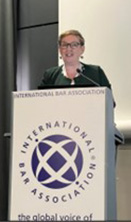 In the vast domain of dispute resolution, the pursuit of justice takes the limelight. However, the question arises: does the ‘pursuit of justice’ merely involve achieving a fair and equitable resolution or should it also emphasise the importance of establishing appropriate pathways leading to such fairness and equity? Access to proper avenues for justice is not a benefit universally open to all. Numerous nations, whether advanced or emerging, have found it difficult to manage the docket explosion of cases at traditional courts every year, even more so burdened with the emergence of a pandemic. Time sensitivity being paramount, such situations compel people to explore alternative methods of dispute resolution.
In the vast domain of dispute resolution, the pursuit of justice takes the limelight. However, the question arises: does the ‘pursuit of justice’ merely involve achieving a fair and equitable resolution or should it also emphasise the importance of establishing appropriate pathways leading to such fairness and equity? Access to proper avenues for justice is not a benefit universally open to all. Numerous nations, whether advanced or emerging, have found it difficult to manage the docket explosion of cases at traditional courts every year, even more so burdened with the emergence of a pandemic. Time sensitivity being paramount, such situations compel people to explore alternative methods of dispute resolution.
Alternative dispute resolution (ADR) methods have, with time, grown to become one of the most sought-after pathways in the pursuit of justice. ADR, with its vast reach, has built a bridge not only between corporate adversaries but also between the ‘people and the State’. Within this, we have witnessed the rise of insightful individuals and conscientious organisations whose efforts have instilled public trust in achieving fair and equitable justice through alternate legal avenues. The Access to Justice and Legal Aid Committee of the International Bar Association has been unwavering in its efforts to promote the adoption of quicker resolution methods for the benefit of the people. This year, the Committee’s session at the 2023 IBA Annual Conference in Paris brought to the forefront some pivotal questions concerning the ADR landscape, and it was a privilege to be granted a scholarship to attend the same.
IBA Access to Justice and Legal Aid Committee Session 2023
The 2023 session of the Access to Justice and Legal Aid Committee effectively delved into the theme of ‘How to ensure equal access to justice in a changing legal landscape’. Chaired by Anne-Marie Blaney, the session was graced by a distinguished panel comprising the following:
- Julieta Ripoli, judge at the Justice Chambers of the Colombian Special Jurisdiction for Peace, created in 2018 to implement the transitional justice component of the peace agreements;
- Mary Walker, barrister and chair of the NSW Bar Association ADR Committee and co-chair of the International Bar Association Mediation Committee and a member of the International Mediation Institute (IMI) Appraisal and Ethics Committees; and
- Angus Glennie, chairman of the Board Scottish Arbitration Centre in Scotland.
The discussion was moderated by Mark Woods, director and accredited specialist in criminal law and family law at Tyler Tipping & Woods and member of the IBA Access to Justice and Legal Aid Committee Advisory Board.
Should ‘ADR’ stand for ‘Appropriate Dispute Resolution’, given the changing legal landscape?
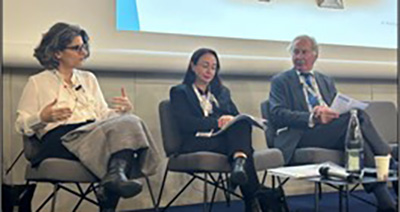 Setting the tone for the session, Woods redefined ADR, proposing to replace ‘alternate’ dispute resolution with ‘appropriate’. This semantic shift sought to underscore the importance of finding suitable pathways for dispute resolution. Expressing their dedication, the panelists emphasised making ADR a complementary and integrative part of their nation’s justice system. More so, Walker walked through her journey of looking into macro and micro problems and designing alternative processes of bespoke nature to address the issues of the 21st century.
Setting the tone for the session, Woods redefined ADR, proposing to replace ‘alternate’ dispute resolution with ‘appropriate’. This semantic shift sought to underscore the importance of finding suitable pathways for dispute resolution. Expressing their dedication, the panelists emphasised making ADR a complementary and integrative part of their nation’s justice system. More so, Walker walked through her journey of looking into macro and micro problems and designing alternative processes of bespoke nature to address the issues of the 21st century.
Equality of arms—who needs it?
Commencing with the aspect of ensuring equality in legal representation, Ripoli stressed the use of common representatives and virtual platforms to facilitate secure participation. She also underscored the importance of training lawyers to address the intricacies of ADR, which involves handling delicate stakeholders and navigating deep moral issues to broker agreements. Ripoli likened her role to that of a translator and elaborated her work to include mediating a dialogue until it settled into an agreement on what transpired, characterising it as a moral undertaking involving emotional engagement with the parties. Seconding Ripoli, Walker stated that the administration of justice does not mandate an inflexible standard of procedural fairness. What is paramount is for procedural fairness to be observed in the process adopted by the parties. Many matters that are initiated in trial, end up being resolved through negotiated outcomes and settlements, with only a small percentage actually going to trial. Understanding that one of the main criticisms of mediation is its confidential nature, the role of the mediator would be to work with the parties and allow them to have a dialogue in a negotiation setting, thereby fostering communication and problem-solving. Delving into the impact of judges, Glennie opined that while it is a grey area, judges could expand their role to assist parties within the circuit of the law. This could not only include noting the obvious points, or appreciating the right to call evidence, but also proactively assisting the translation of lay terms, used by unrepresented individuals, into terms with acceptable legal standards. Additionally, Walker discussed the delicate balance of power, recognising the distinction between perceptions of power and actual power imbalances. She noted that in mediation, parties have the opportunity to determine the process and outcomes, providing more input into the dialogue and its engagement, as well as the eventual outcome.
What is the role of mediators?
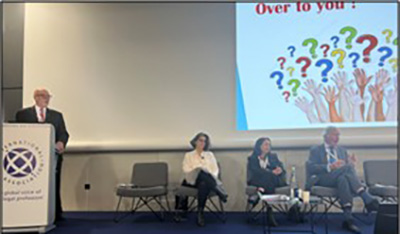 Discussing the contribution and role of lawyers in the realm of appropriate dispute resolution, Woods began by contending that lawyers significantly add value to the dispute resolution processes. Ripoli emphasised that it was more about the centrality of the law itself, asserting that lawyers play a crucial role in restoring legitimacy to the legal framework, whether dealing with a civil war or a corporate dispute. Highlighting the importance of emotional intelligence, Ripoli encouraged the need for lawyers who can remain impartial, decipher which law is legitimate, and understand the moral dimensions of legal principles. She underscored the deep integration of the legal system with cultural meanings and its societal impact. Walker concurred that lawyers bring objectivity to the table and emphasised the value of skilled lawyers who approach problem-solving with a forward-looking perspective. She encouraged lawyers working closely with clients, particularly those facing disadvantages or lacking access to courtrooms to achieve better outcomes. In addition, Glennie noted that while lawyers perform risk analysis, it is crucial to ensure fairness when one party is not represented. While state funding was a potential solution, he emphasised the importance of common-sense prevailing in varied legal situations.
Discussing the contribution and role of lawyers in the realm of appropriate dispute resolution, Woods began by contending that lawyers significantly add value to the dispute resolution processes. Ripoli emphasised that it was more about the centrality of the law itself, asserting that lawyers play a crucial role in restoring legitimacy to the legal framework, whether dealing with a civil war or a corporate dispute. Highlighting the importance of emotional intelligence, Ripoli encouraged the need for lawyers who can remain impartial, decipher which law is legitimate, and understand the moral dimensions of legal principles. She underscored the deep integration of the legal system with cultural meanings and its societal impact. Walker concurred that lawyers bring objectivity to the table and emphasised the value of skilled lawyers who approach problem-solving with a forward-looking perspective. She encouraged lawyers working closely with clients, particularly those facing disadvantages or lacking access to courtrooms to achieve better outcomes. In addition, Glennie noted that while lawyers perform risk analysis, it is crucial to ensure fairness when one party is not represented. While state funding was a potential solution, he emphasised the importance of common-sense prevailing in varied legal situations.
How do we ensure outcomes are objectively fair?
Transitioning to the discussion on how we could ensure outcomes are objectively fair, Ripoli underlined the significance of confronting the truth of the facts and emphasising the moral dimension of what transpired. She noted that terms like ‘objective’ and ‘subjective’ outcomes seldom capture the real experiences of victims. Walker expanded by highlighting that the core of mediation is negotiation. While there have been challenges involving duress, undue influence and misrepresentation in mediation, confidentiality provisions in such cases could be temporarily lifted for investigative purposes—ultimately, giving the idea of public interest, its due importance. Contributing further, Glennie stressed that every legal practitioner must know that justice should be handed over as the earliest thing. He elaborated on provisions in Scotland, where arbitration is confidential, and breaches of confidentiality are legally actionable. However, he acknowledged exceptions and highlighted that confidentiality protections should allow for investigations into potential abuses that might otherwise remain hidden.
What is the future?
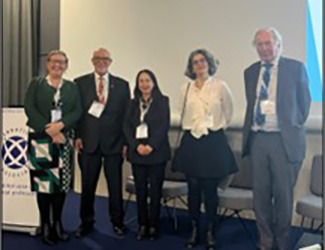 Looking into the future, Ripoli brought forward the significance of active listening as a pathway to a progressive resolution. Drawing from her own experiences, she narrated the common experience of victims and perpetrators feeling unheard, wherein attention to emotional intelligence was a necessity. Ripoli highlighted the potential for self-healing that arises from the communal power of shared experiences, emphasising the importance of knowing oneself to be a part of a community and actively seeking similar forms of justice in the aftermath of shared adversity.
Looking into the future, Ripoli brought forward the significance of active listening as a pathway to a progressive resolution. Drawing from her own experiences, she narrated the common experience of victims and perpetrators feeling unheard, wherein attention to emotional intelligence was a necessity. Ripoli highlighted the potential for self-healing that arises from the communal power of shared experiences, emphasising the importance of knowing oneself to be a part of a community and actively seeking similar forms of justice in the aftermath of shared adversity.
Echoing similar views, Walker articulately captured the concept of a ‘triage’ as a bespoke design and development within the ADR system. She proposes ADR professionals to employ the triage, which includes (i) comprehending the problem without instantly labelling it as a dispute or conflict; (ii) determining whether it is really a dispute and in what context; and (iii) assessing what would constitute an appropriate ADR process within a broader context. Walker emphasised the necessity of avoiding assumptions and premature interventions. Addressing the paradigms of the future, she noted the emergence of polycentric disputes with multiple centres which look at one problem at one time. She anticipates future innovation and the potential for remote resolution, particularly in the context of the pandemic, providing a secure space for those unable to physically attend courts. Building on this, Glennie delved into the integration of artificial intelligence (AI) in enhancing access to justice. He envisioned ChatGPT and similar systems to be playing a crucial role in improving case analysis. While acknowledging occasional mishaps, Glennie predicted the establishment of efficient systems capable of resolving disputes within days rather than years.
Closing summary
Towards the end, Woods encouraged the audience to raise their questions and the session witnessed significant engagement as attendees posed thought-provoking questions regarding the functioning of legal aid systems worldwide. In conclusion, Blaney expressed appreciation for a wonderful contribution, highlighting discussions on fairness, equality and inequality in justice. She re-emphasised the importance of delivering quality justice by actively listening to victims and considering processes for litigants with bespoke designs in transitional justice, mediation and arbitration. The overarching theme was building trust in the justice process and Blaney extended gratitude to contributors, Glennie, Walker and Ripoli, for thoughtfully elaborating on the same.
Conclusion
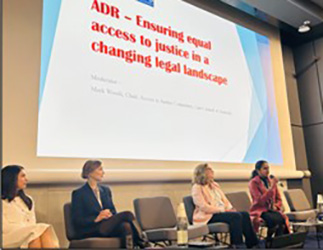 In the wise words of ChatGPT, access to justice is the cornerstone of a society’s commitment to fairness, where the path to resolution is as important as the resolution itself. The discussions throughout the session unveiled a transformative perspective on alternative dispute resolution. Woods’ proposition to redefine ADR as ‘appropriate’ resonates as a vital shift, stressing the need for better and more suitable pathways in dispute resolution. Ripoli’s suggestion on judges adapting to the role of a translator, and Walker’s encouragement for procedural flexibility brings to light the nature of adaptability in ADR methodologies. Furthermore, the key role of lawyers, ensuring fairness of outcomes, and anticipating future challenges, including the integration of AI, as pointed out by Glennie, indicate an innovative future for dispute resolution. As we course through the path of transformation, it becomes apparent that the future of dispute resolution is not just the evolution of methodologies but also requires a profound understanding of the human experience within the legal framework. With the emergence of technology in almost all segments of life, the concept of access to justice should also evolve to adapt to its transformative potential.
In the wise words of ChatGPT, access to justice is the cornerstone of a society’s commitment to fairness, where the path to resolution is as important as the resolution itself. The discussions throughout the session unveiled a transformative perspective on alternative dispute resolution. Woods’ proposition to redefine ADR as ‘appropriate’ resonates as a vital shift, stressing the need for better and more suitable pathways in dispute resolution. Ripoli’s suggestion on judges adapting to the role of a translator, and Walker’s encouragement for procedural flexibility brings to light the nature of adaptability in ADR methodologies. Furthermore, the key role of lawyers, ensuring fairness of outcomes, and anticipating future challenges, including the integration of AI, as pointed out by Glennie, indicate an innovative future for dispute resolution. As we course through the path of transformation, it becomes apparent that the future of dispute resolution is not just the evolution of methodologies but also requires a profound understanding of the human experience within the legal framework. With the emergence of technology in almost all segments of life, the concept of access to justice should also evolve to adapt to its transformative potential.
 In the vast domain of dispute resolution, the pursuit of justice takes the limelight. However, the question arises: does the ‘pursuit of justice’ merely involve achieving a fair and equitable resolution or should it also emphasise the importance of establishing appropriate pathways leading to such fairness and equity? Access to proper avenues for justice is not a benefit universally open to all. Numerous nations, whether advanced or emerging, have found it difficult to manage the docket explosion of cases at traditional courts every year, even more so burdened with the emergence of a pandemic. Time sensitivity being paramount, such situations compel people to explore alternative methods of dispute resolution.
In the vast domain of dispute resolution, the pursuit of justice takes the limelight. However, the question arises: does the ‘pursuit of justice’ merely involve achieving a fair and equitable resolution or should it also emphasise the importance of establishing appropriate pathways leading to such fairness and equity? Access to proper avenues for justice is not a benefit universally open to all. Numerous nations, whether advanced or emerging, have found it difficult to manage the docket explosion of cases at traditional courts every year, even more so burdened with the emergence of a pandemic. Time sensitivity being paramount, such situations compel people to explore alternative methods of dispute resolution. Setting the tone for the session, Woods redefined ADR, proposing to replace ‘alternate’ dispute resolution with ‘appropriate’. This semantic shift sought to underscore the importance of finding suitable pathways
Setting the tone for the session, Woods redefined ADR, proposing to replace ‘alternate’ dispute resolution with ‘appropriate’. This semantic shift sought to underscore the importance of finding suitable pathways Discussing the contribution and role of lawyers in the realm of appropriate dispute resolution, Woods began by contending that lawyers significantly add value to the dispute resolution processes. Ripoli emphasised that it was more about the centrality of the law itself, asserting that lawyers play a crucial role in restoring legitimacy to the legal framework, whether dealing with a civil war or a corporate dispute. Highlighting the importance of emotional intelligence, Ripoli encouraged the need for lawyers who can remain impartial, decipher which law is legitimate, and understand the moral dimensions of legal principles. She underscored the deep integration of the legal system with cultural meanings and its societal impact. Walker concurred that lawyers bring objectivity to the table and emphasised the value of skilled lawyers who approach problem-solving with a forward-looking perspective. She encouraged lawyers working closely with clients, particularly those facing disadvantages or lacking access to courtrooms to achieve better outcomes.
Discussing the contribution and role of lawyers in the realm of appropriate dispute resolution, Woods began by contending that lawyers significantly add value to the dispute resolution processes. Ripoli emphasised that it was more about the centrality of the law itself, asserting that lawyers play a crucial role in restoring legitimacy to the legal framework, whether dealing with a civil war or a corporate dispute. Highlighting the importance of emotional intelligence, Ripoli encouraged the need for lawyers who can remain impartial, decipher which law is legitimate, and understand the moral dimensions of legal principles. She underscored the deep integration of the legal system with cultural meanings and its societal impact. Walker concurred that lawyers bring objectivity to the table and emphasised the value of skilled lawyers who approach problem-solving with a forward-looking perspective. She encouraged lawyers working closely with clients, particularly those facing disadvantages or lacking access to courtrooms to achieve better outcomes. Looking into the future, Ripoli brought forward the significance of active listening as a pathway to a progressive resolution. Drawing from her own experiences, she narrated the common experience of victims and perpetrators feeling unheard, wherein attention to emotional intelligence was a necessity. Ripoli highlighted the potential for self-healing that arises from the communal power of shared experiences, emphasising the importance of knowing oneself to be a part of a community and actively seeking similar forms of justice in the aftermath of shared adversity.
Looking into the future, Ripoli brought forward the significance of active listening as a pathway to a progressive resolution. Drawing from her own experiences, she narrated the common experience of victims and perpetrators feeling unheard, wherein attention to emotional intelligence was a necessity. Ripoli highlighted the potential for self-healing that arises from the communal power of shared experiences, emphasising the importance of knowing oneself to be a part of a community and actively seeking similar forms of justice in the aftermath of shared adversity. In the wise words of ChatGPT, access to justice is the cornerstone of a society’s commitment to fairness, where the path to resolution is as important as the resolution itself. The discussions throughout the session unveiled a transformative perspective on alternative dispute resolution. Woods’ proposition to redefine ADR as ‘appropriate’ resonates as a vital shift, stressing the need for better and more suitable pathways in dispute resolution. Ripoli’s suggestion on judges adapting to the role of a translator, and Walker’s encouragement for procedural flexibility brings to light the nature of adaptability in ADR methodologies. Furthermore, the key role of lawyers, ensuring fairness of outcomes, and anticipating future challenges, including the integration of AI, as pointed out by Glennie, indicate an innovative future for dispute resolution. As we course through the path of transformation, it becomes apparent that the future of dispute resolution is not just the evolution of methodologies but also requires a profound understanding of the human experience within the legal framework. With the emergence of technology in almost all segments of life,
In the wise words of ChatGPT, access to justice is the cornerstone of a society’s commitment to fairness, where the path to resolution is as important as the resolution itself. The discussions throughout the session unveiled a transformative perspective on alternative dispute resolution. Woods’ proposition to redefine ADR as ‘appropriate’ resonates as a vital shift, stressing the need for better and more suitable pathways in dispute resolution. Ripoli’s suggestion on judges adapting to the role of a translator, and Walker’s encouragement for procedural flexibility brings to light the nature of adaptability in ADR methodologies. Furthermore, the key role of lawyers, ensuring fairness of outcomes, and anticipating future challenges, including the integration of AI, as pointed out by Glennie, indicate an innovative future for dispute resolution. As we course through the path of transformation, it becomes apparent that the future of dispute resolution is not just the evolution of methodologies but also requires a profound understanding of the human experience within the legal framework. With the emergence of technology in almost all segments of life,